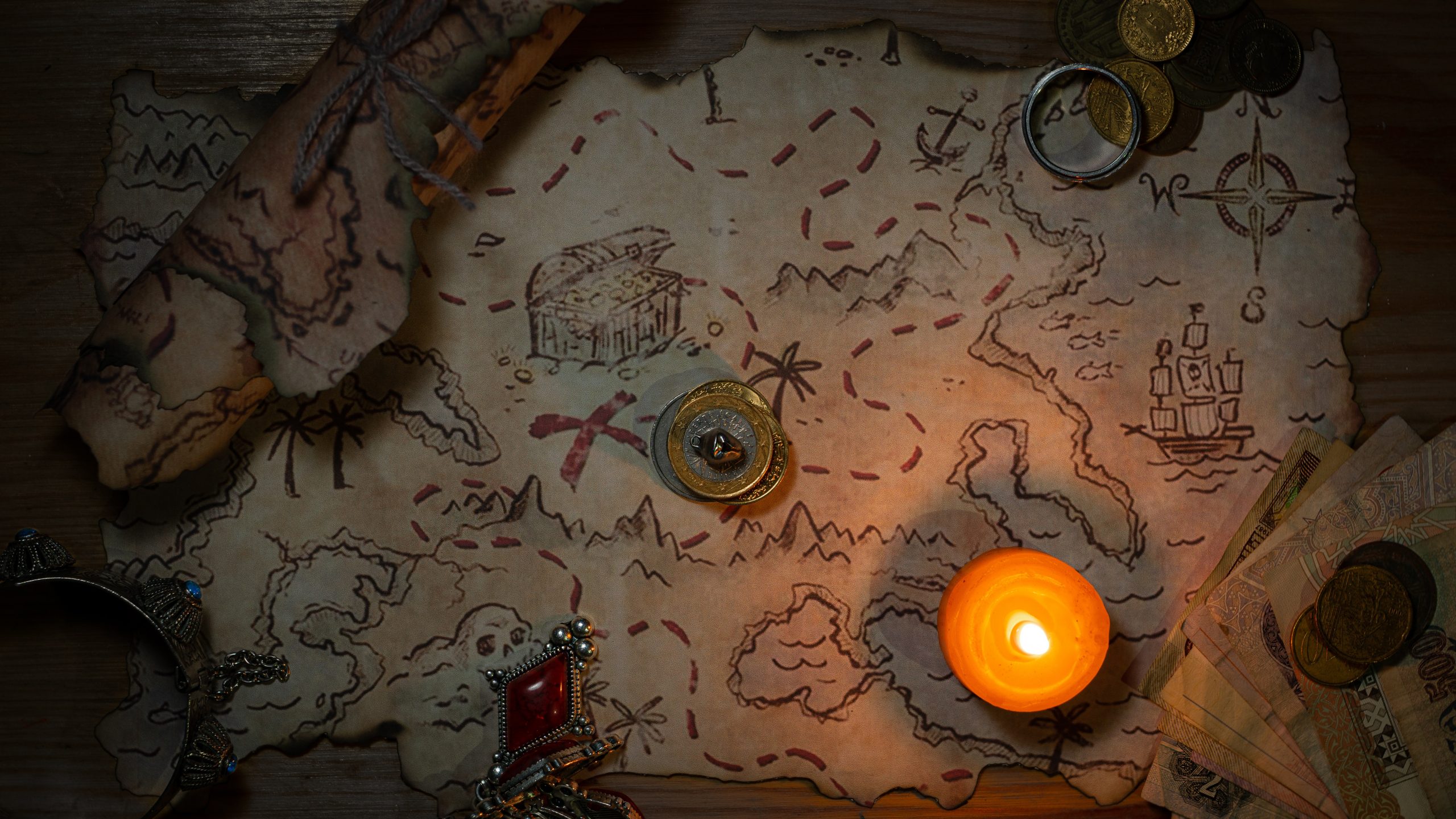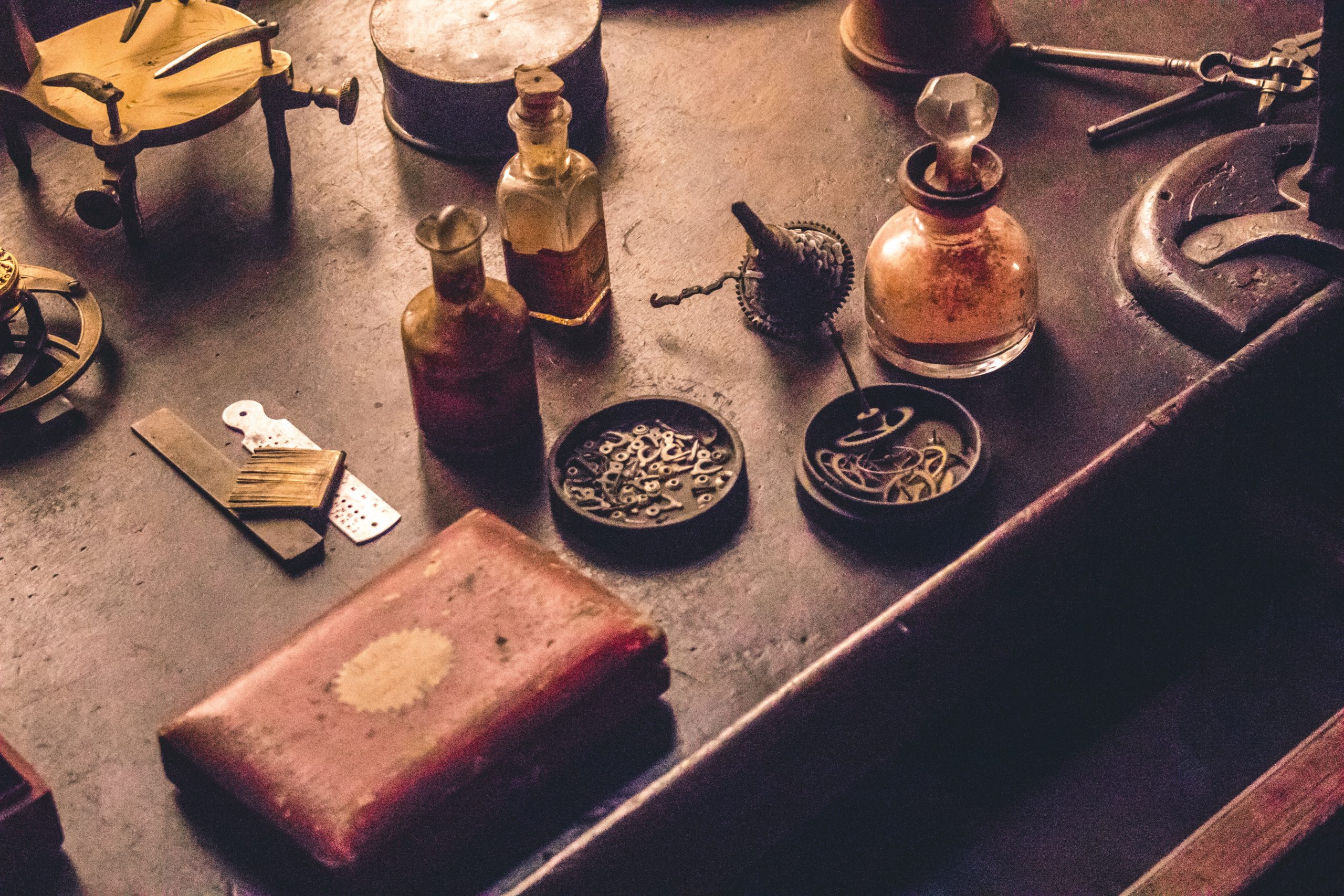The episode begins in a funeral parlour. We see a grandson mourning at his grandmother's open coffin and the undertaker. When the grandson asks to be alone with the dead woman for a moment, something strange and frightening happens. A blue mist rises, the woman's face begins to glow and she opens her eyes. The completely stunned grandson is grabbed and strangled. The undertaker comes back into the room because of the sounds of fighting and manages to free the man from his grandmother's grip. He tries to lock the supposed dead woman back into the coffin, but is overpowered by her. From his words we can infer that this is not the first such incident. The dead woman leaves the funeral home and as the blue glow grows stronger, she lets out a scream.
In a short cutscene we see the Doctor and Rose trying with some difficulty to steer the TARDIS. The Doctor manoeuvres them into what appears to be the year 1860.
Back at the Undertaker's, he calls his maid Gwyneth and, when she appears, reproaches her for not being there. He orders her to harness the carriage and reports what has happened. Again it becomes clear that this was not the first incident of this kind and Gwyneth, speaks of the house being cursed and that they desperately need help. We also learn that the walking dead's grandson was probably killed by her.
The TARDIS materialises in a side street and we see Rose and the Doctor lying on the ground laughing. The Doctor is convinced he has taken them both to Naples for Christmas Eve in 1860. When Rose just wants to storm out the door, the Doctor reprimands her, as she would probably cause a riot in her current clothes. So Rose is sent to the dressing room.
Meanwhile, we again see the so-far unsuccessful efforts of the undertaker and Gwyneth to find the dead woman. Due to the hopeless search, the undertaker forces his maid to use her gift, which he calls the second sight. After a brief refusal, Gwyneth senses the wandering deceased's thoughts. She realises that shortly before her death, the wanted woman was going to see a very well-known man.
Next we see Charles Dickens sitting in his dressing room, apparently suffering from a headache. A man points out to him that Dickens needs to go on stage. Dickens complains to the man about his discomfort, which is mainly the repetition of the same performance over and over again.
Rose emerges from the dressing room again and her outfit is complimented by the Doctor. The two leave the TARDIS and step out into the snow.
Charles Dickens steps in front of an applauding audience, in which the walking dead can already be seen. She stares at the celebrated author. At the same time, Gwyneth and her employer, as well as the Doctor and Rose, pass by the theatre. Gwyneth is sure that the target of their search is inside. The Doctor buys a newspaper and notices that he has got it a bit wrong. It is not 1860 but 1869 and they are not in Naples but in Cardiff. On stage Charles Dickens is reciting from his well-known Christmas story. In the middle of the recitation, the dead woman's face begins to glow bluish again, but this time the glow leaves her body and flies around the room. The audience panics and against the tide of people Rose, the Doctor, the Undertaker and Gwyneth enter the room. The latter grab the woman's slumped body and carry it out of the room, with Rose in pursuit. The doctor, meanwhile, introduces himself to Dickens and asks him things about the apparition which he thinks are a bad joke.
Outside, Rose confronts Gwyneth, who tries to talk her way out of the matter. However, when Rose realises that the woman is dead, the undertaker is forced to sedate her and lock her in the car, under protest from Gwyneth, as she has already seen too much. Inside, the doctor realises that the apparition is a being made of gas. He runs outside and only sees the carriage driving away. When he hijacks Dickens' carriage to pursue him, he also learns who the man is whose performance has been disrupted. The doctor immediately reveals himself to be an ardent admirer.
The undertaker and Gwyneth bar Rose on a table. When there is a knock at the door, the undertaker instructs his maid to turn away the knockers and hides. Meanwhile, Rose awakens from her stupor, while in the background the grandson also awakens and lunges at Rose with his grandmother. However, the Doctor and Charles Dickens are able to save her and the Doctor talks to the creatures. They ask him to open the rift, as they are weak and cannot exist in their present form.
The protagonists have an animated discussion about what has happened. Dickens does not believe what he has seen and thinks it is an illusion. Gwyneth gives the Doctor pause when she hands him a cup of tea with the words "just the way they like it". The Doctor explains that the cause of the apparitions is a rift in the space-time continuum that is widening.
The Doctor then talks to Dickens about what he thinks must be illusions and gives him something to think about. In addition, Rose converses with Gwyneth and is confronted with the social circumstances and customs of the time she is visiting, throwing Gwyneth into a certain amused consternation. Through a remark about Rose's dead father, she becomes aware of Gwyneth's special ability. When this is revealed to her, the Doctor hears this too, explaining it by saying that she grew up close to the rift.
This gives the Doctor the idea of holding a seánce, which Dickens attends very reluctantly. The blue mist enters the room and the Doctor realises that Gwyneth is controlling the rift, not being controlled by it. Gas beings materialise behind her, astonishing those present and revealing themselves to be Gelth. They ask the doctor for help, as they are the last of their kind. The eternal war has destroyed their bodies and made them refugees. To help the Gelth, Gwyneth is to be taken to the rift and open it so that the Gelth can continue to exist in the bodies of deceased humans.
After the Gelth disappear and Gwyneth wakes up from a faint, everyone debates whether Gwyneth should open the rift and whether it is right to let the Gelth walk the earth in corpses. However, Gwyneth makes this decision herself and decides to help the Gelth.
In the morgue, the Doctor enlightens Rose that time can be rewritten. Then the Gelth show up and are happy to be helped. The Doctor makes the condition that this is only an interim solution and that he will take the Gelth to another place where they can form their own bodies.
After Gwyneth has placed herself in an archway and opened the passageway, however, the Gelth reveal their true colours and it turns out that it is an invasion. Billions of Gelth want to cross over to Earth and they all need corpses as new bodies.
How they want to obtain these bodies is then promptly shown when the undertaker, after trying in vain to get Gwyneth to close the rift, is killed by a resurrected corpse and is promptly "occupied" by a Gelth as well. The Gelth legions take possession of more and more corpses in the morgue and the Doctor and Rose can only barely escape behind an iron barred door. While the Doctor reproaches the Gelth for hoodwinking him, Dickens flees the house but is pursued by the Gelth. As he flees, he has a brilliant idea. He extinguishes the flames of the gas lights and turns on the gas at the same time. When the doctor then also rips the gas pipe out of the wall, the Gelth are drawn out of their bodies into the gas, as it is more like their natural environment.
The Doctor now tries to get Gwyneth to close the rift before the living people present suffocate. But Gwyneth cannot do this. However, she sees an opportunity to sacrifice herself and keep the Gelth in the house. Rose tries to stop her, but the Doctor realises that she was already dead. Dickens gets Rose out of the building and the Doctor makes it out too, just before Gwyneth ignites the gas with a match. At the farewell afterwards, the Doctor gives great comfort to Charles Dickens, who will die in the coming year, by revealing to him that his works will last forever.










